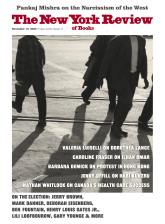I often tell my students that two hideous demons slumber under the floorboards of Western culture: anti-Semitism and anti-Black racism. And they can erupt through those floorboards at any time.
I wonder when Black people, especially Frederick Douglass, realized that after all their arduous work in the abolitionist movement and the sacrifices of the Civil War, the world of freedom and equality they had lived to see was being destroyed before their eyes. It was happening with the complicity of the Supreme Court, as white men, North and South, realized that they had far more economic and, perhaps, metaphysical interests in common with one another than they did with Black people. This was a devastating moment—perhaps the devastating moment—in the history of American race relations, after slavery itself.
Clearly Douglass was worried as early as May 10, 1865 (a month and a day after Robert E. Lee’s surrender to Ulysses S. Grant at Appomattox), when in an address to the American Anti-Slavery Society he mused that slavery
has been called by a great many names, and it will call itself by yet another name; and you and I and all of us had better wait and see what new form this old monster will assume, in what new skin this old snake will come forth next.
Ten years later, in a prescient and dark address, he asked, “If war among the whites brought peace and liberty to the blacks, what will peace among the whites bring?”
The answer to that rhetorical question we know too well: in 1883 the Supreme Court struck down the Civil Rights Act of 1875, which was revolutionary in its determination to ensure Black equality. The “Mississippi Plan” of 1890 then revised the state’s constitution to effectively circumvent the Fifteenth Amendment, which had declared that the right to vote could not be denied on the basis of race, and set off a chain reaction throughout the South of states passing new constitutions that followed the Mississippi model. How effective was the disenfranchisement that followed? In 1898, in Louisiana, 130,000 Black men were registered to vote. By 1904 that number had been reduced to 1,342. And it was the Supreme Court that established Jim Crow segregation as the law of the land, effectively creating an apartheid state.
In his fascinating new book, Time of the Magicians, Wolfram Eilenberger notes that the German philosopher Ernst Cassirer was acutely aware of two troubling characteristics of every culture. Cassirer, who was Jewish and left Germany in 1933 after the Nazis came to power, said of modern societies that “every developmental step” they have taken “can be reversed,” and that it is at times of “greatest crisis, tension, and confusion” that the danger of relapse is greatest. One of the central questions of American history is this: How could Black men be given the vote in 1867 in the South, and how could some two thousand of them serve at every level of government during Reconstruction—including two senators—but then be systematically deprived of the vote hardly more than a generation later?
The rollback of Black rights following the collapse of Reconstruction also involved a conspiracy between forces in the North as well as the South. One reason, certainly, was the enormous potential of the Black vote. When Black men in the former Confederacy were given the right to vote by the first Reconstruction Act in 1867, it is estimated that some 500,000 cast their ballots in the election of 1868, in which Ulysses S. Grant was elected president by a margin of just over 300,000 votes. Black men, it could be said, had actually elected a president, three years after the abolition of slavery.
This was the first manifestation, as Congressman Jim Clyburn once said to me, of an unprecedented degree of “Black Power.” So the potential for Black political domination of the former Confederacy by this mini–Black republic within a republic was undeniable—and undeniably frightening to a host of political and economic interests. As the novelist Thomas Dixon put it in his unapologetically racist novel The Leopard’s Spots (1902), “So long as the Negro is here with a ballot in his hands he is a menace to civilization.” Slavery was not the menace; the right of Black people to vote was.
“The sleep of reason breeds monsters,” Goya reflected in 1799. Judging from events unfolding in American society since the end of Barack Obama’s second term, it seems fair to say that the dream of Black equality breeds monsters as well.
As I think—worry, really—about the enormous implications of the coming election, I cannot help but wonder how that slumbering beast of white supremacy arose from deep in the American psyche with such heinous energy and vitriol after the “promised land” election of our nation’s so elegantly capable first Black president. If Donald Trump is reelected, and affirmative action, abortion, affordable health care, and voting rights end up in the hands of an unabashedly conservative Supreme Court, will it feel to us like it felt to Douglass when Reconstruction collapsed?
Advertisement



